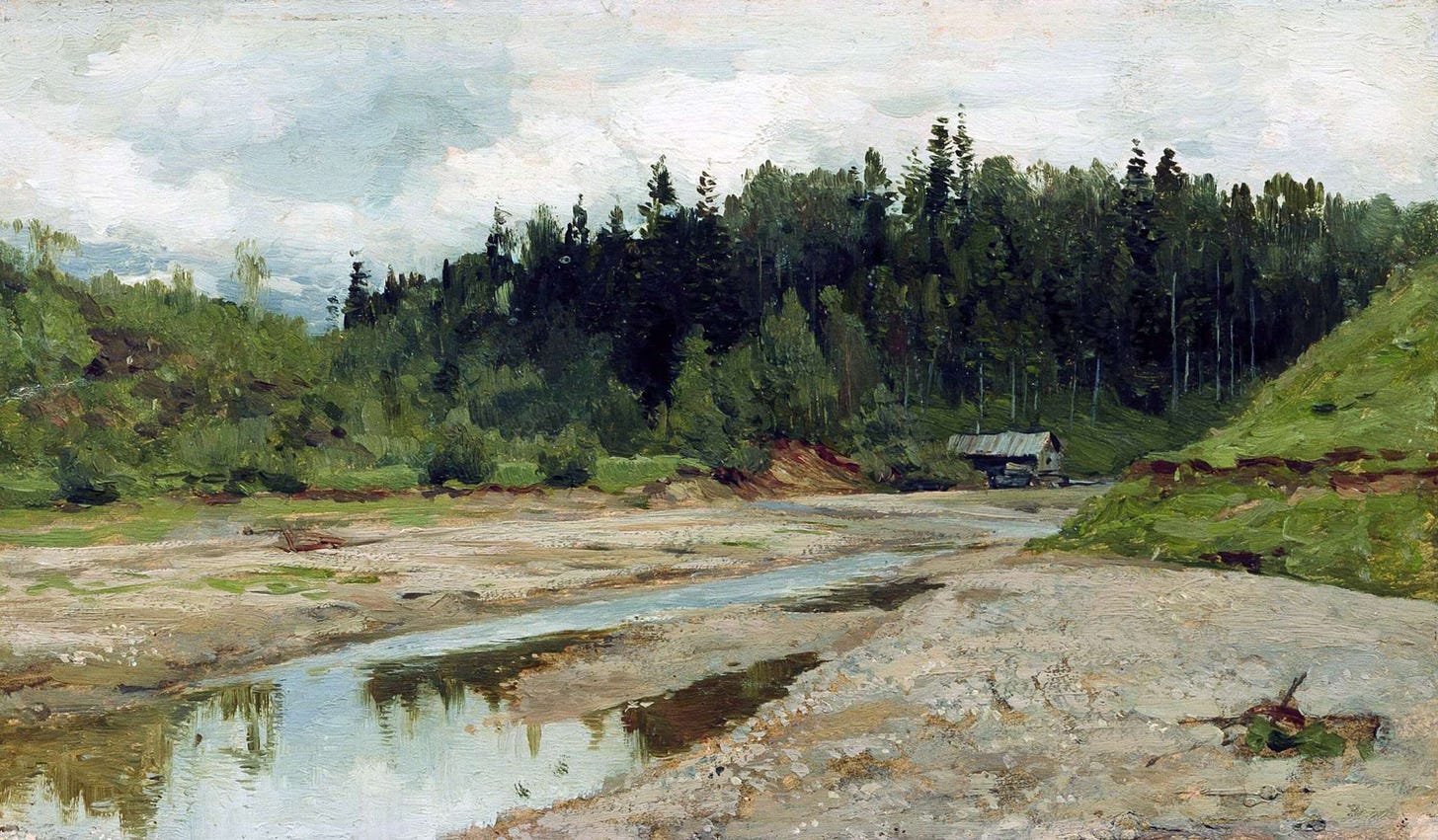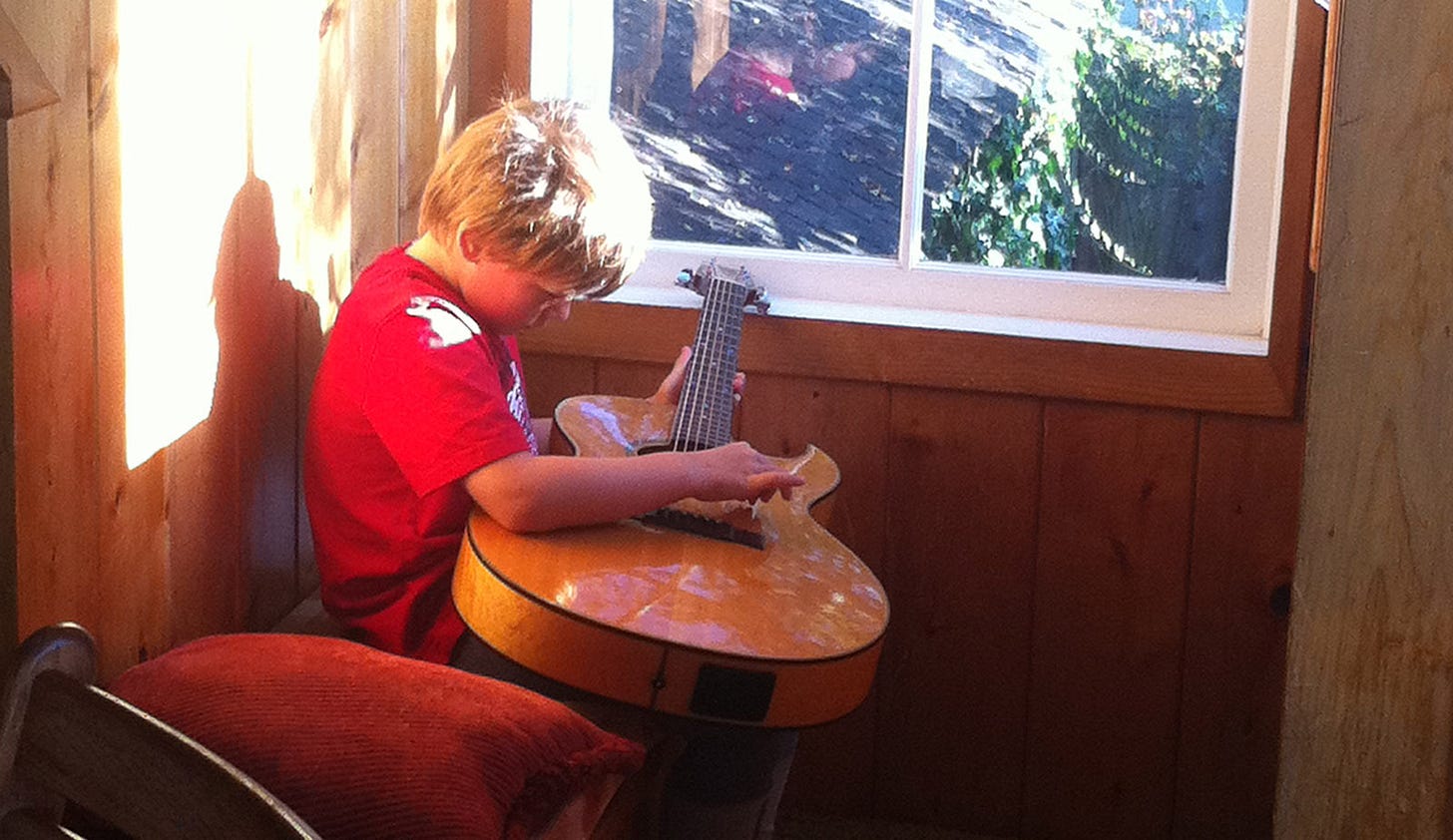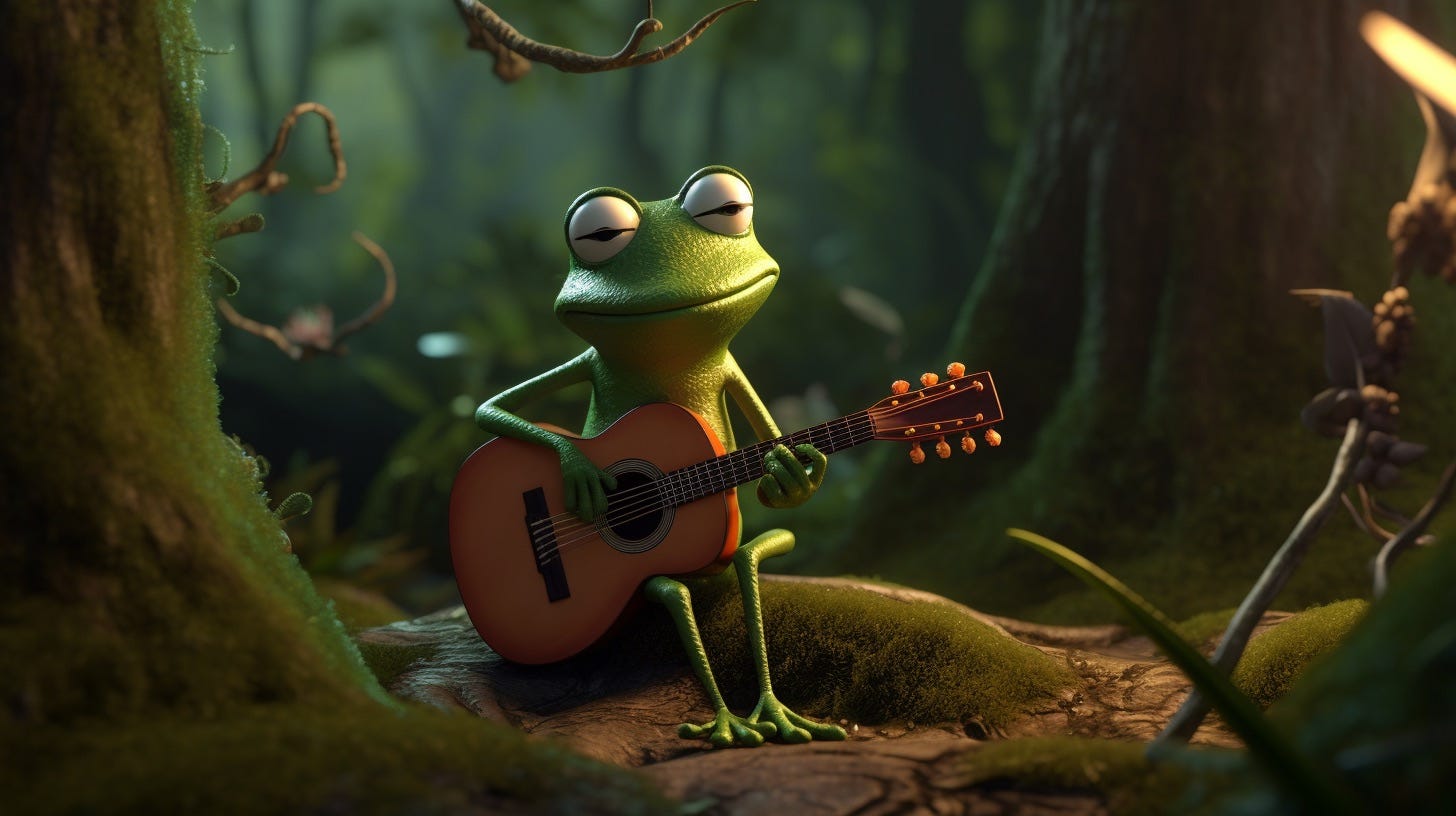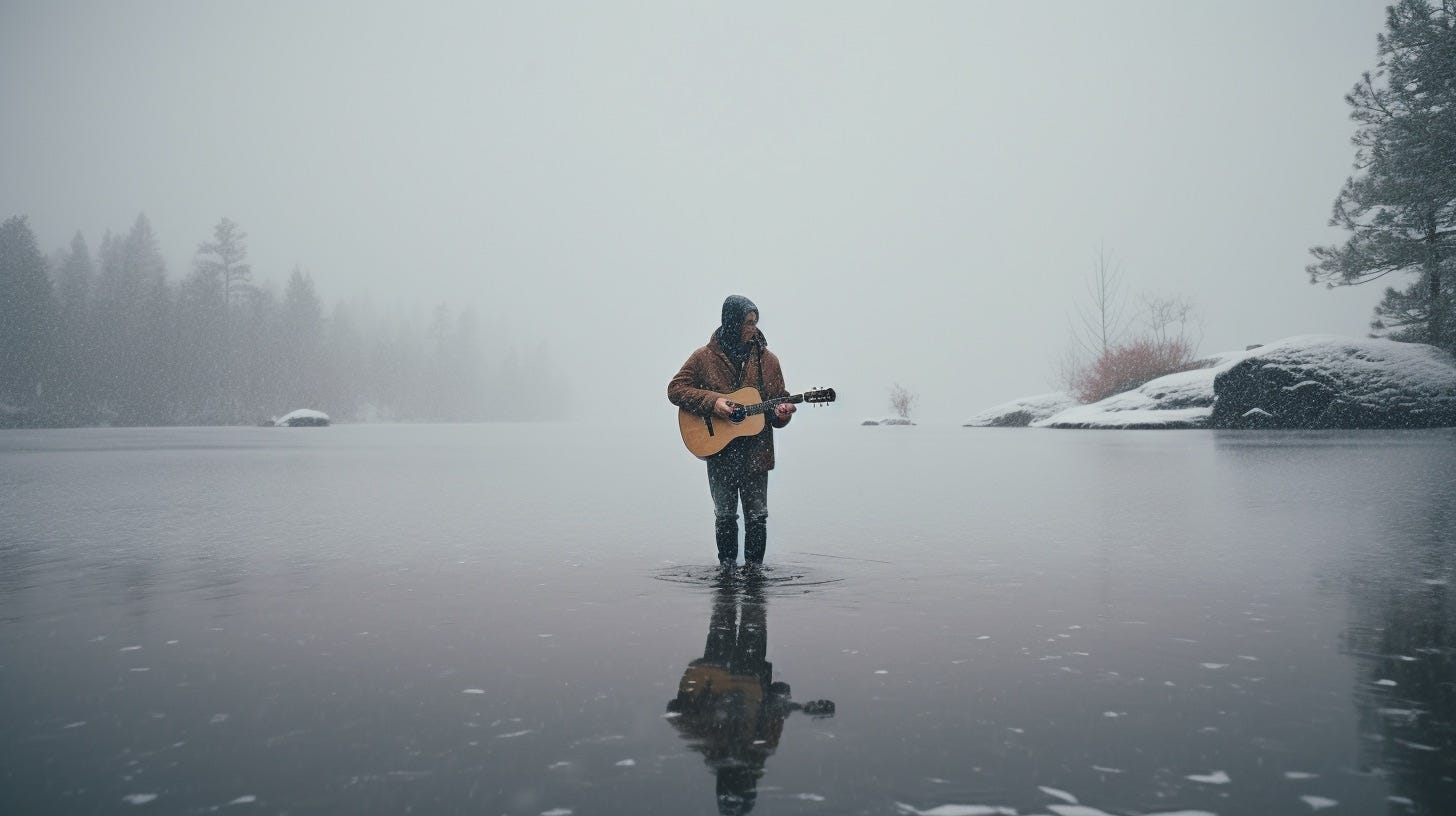Nothing about AI, this time. Relax.
This post’s things are physical objects, and I’m just going to talk about them. I have no idea whether it’s interesting but I’ve written it now, so I guess we’ll see.
The instrument on the left was the first I ever owned. In fact, as the piano in my childhood home — though I was the one playing it 90% of the time — was family property, I guess it was the first instrument of any kind that was actually mine.
It was acquired in Moscow on a trip my family made to the USSR in 1978. You’d be right in suspecting that Westerners camping in the Soviet Union wasn’t exactly common during the Brezhnev era: it only happened because my father had spent the previous several years forging links to academics behind the Iron Curtain and wanted to share the country with his family — knowing that my mother, who I never saw cowed by anything or anyone, would just say “Hell yeah, sounds weird, let’s do it,” and start packing. As part of this he’d learned some of the language, too, which helped a lot, aided by the German and French at mom’s disposal.
He jumped through all the bureaucratic hoops required to get permission for the trip, and off the four of us went, driving all the way from London.
It was quite a journey. Our car was effectively dismantled on the way into the USSR — they took the side panels off as part of the search — with a couple of books (my father’s well-read copy of The Russians by Hedrick Smith, and my paperback of Beatles lyrics) temporarily confiscated during the hours this took. We were the only Westerners we encountered during the entire period, during which we lived either in our tent or small vacation huts. With his prior experience, Dad had encouraged us to bring along old pairs of jeans — then a desirable and rare commodity in the Soviet Union — and we swapped them for handfuls of the patriotic badges ubiquitous at the time, often to kids who ran up to the car in packs to ask if we had any Western swag.
We spent a while in Moscow being squired around by the official translator he’d been served by on earlier visits, including visiting galleries full of Victorian Russian landscapes, for which I retain an affection to this day. My mother added to their set of the traditional lacquer boxes, most of which I have now: a collection I’m steadily making larger, now I’ve realized how much I like those too.
The entire experience was quietly extraordinary. Partly through episodes like when my father accidentally diverged from the route he’d had to declare ahead of time, causing a previously-unnoticed car to pull us over and politely but firmly put us back on track. More simply through the oddness of it all. It was like, in retrospect, spending time in a parallel universe or low-key urban fantasy, where everything was different yet everything also the same. The Russians (despite everything Western culture suggested at the time) were people just like us, extremely welcoming and kind — one of a thousand reasons I find their government’s assault on Ukraine in their name so miserably horrific. The world and rules and circumstances they lived in, however, in everything from the way stores ran to the shape of the buildings, was subtly alien. I’m sure the experience fundamentally shaped the fiction I’ve gone on to write.
One memorable night involved my parents — neither of whom were gregarious (my father was pretty shy before he got to know someone, and while mum was good at being sociable she was happy being solitary and silent too), yet somehow able to simply get on with people, any people, anywhere — bonded with a couple of guys around the fire at a campsite outside Kiev. We shared our food, and they shared theirs: I remember one guy’s technique for holding a sausage and a lump of cheese in one hand, and deftly using a (not especially clean) knife to alternately cut off slices of both. The other had an acoustic guitar, and I guess it was through hearing him play that I conceived a desire for one. There’s no other instrument which, when played in the dark around a fire, makes you think so strongly: I want to be able to do that.
In Moscow we were taken to a Beryozka, the small chain of state-run stores whose purpose was to provide luxury goods in exchange for the foreign currency the country sorely needed. They were, therefore, the preserve of government officials and exalted foreign guests (or randos like us, who happened to know the system). This one happened, on this day to have an acoustic guitar, and I wound up owning it. My dad used to recall us making our way back to the car afterwards and people on the street stopping us in wonder, asking where the hell we’d been able to buy such a thing. It made it safely home to England, and I started playing.
In all honesty, it is not a triumph of the luthier’s art. As you’ll see from the picture, the distance from the sound hole to the bridge is unusually large in comparison to the other two, as if the maker had read a description of an acoustic guitar and did his best. The “action” — the distance between the string and the fretboard at the 12th fret — is dreadful: over 10mm. On the Martin (the guitar on the right, which I’ll come to in a while) it’s a little under 3mm.
This makes the Russian guitar really quite hard to play. But the extra strength and dedication it took to hold down notes and chords was probably good training for my novice fingers, and when you’re starting, any guitar is good enough. I certainly didn’t have the confidence to try to remedy it by adjusting the truss rod (which would have stood a good chance of cracking the neck) and so I just soldiered on.
In time I added a cheap, clip-on electric pickup and a cheap amp — turning it into a half-assed electric. The first song I ever played that way was “Satisfaction”, by the Stones, and it sounded pretty good to me. After a year or so however it became clear that the limitations of the instrument made it simply impossible to play the kind of songs I wanted to learn at the time — chiefly Dire Straits and AC/DC — and I eventually graduated to a very inexpensive Les Paul copy, and then by my late teens to a Squire Strat (the inexpensive Japanese-made line that Fender introduced in the 1980s: the current generation of Squires are rather better).
The Strat saw hard action for a number of years and has traveled with me ever since, though was superseded a few years ago by a “real” Fender Telecaster, which proved you really do get what you pay for — while the Les Paul copy and the Russian stayed in my old bedroom at my father’s house in the UK.
When clearing this out last year after his death toward the end of 2021, I gave away the Les Paul, but kept the Russian. It, along with a small amount of other stuff, was recently shipped to where we now live, Santa Cruz, California.
The guitar in the middle of the top picture is a Washburn electro-acoustic (an acoustic guitar with built-in pickup and sound controls) bought in my twenties, and along for the ride in my life since then. When my wife and young son and I moved to California twelve years ago, all we brought was a few suitcases and this guitar.
The Martin, on the far right of the main picture, is the most recent acquisition. I bought it last year as a kind of memorial gift from my father, who loved music and encouraged me to play, from my earliest days to the end of his life.
It’s a 000-15M, and… oh boy. Don’t get me wrong: the Washburn was the best I could afford at the time, is a nice instrument, and has done me long service. I’ve had many happy hours with it. It’s an old friend. But partly because the Martin is a dedicated acoustic (electro-acoustics never give the same tone), but mainly because the Martin is a freakin’ Martin, the difference is clear from the first chord you play. There’s a warmth and depth and richness that makes almost anything you play sound two hundred percent better. For a while, at least...
I’m not actually very good on the guitar. That’s not false modesty. I’ve never had the time or dedication to do the relentless practice that mastery takes. I seldom play in front of people, either. It’s a private thing, and almost — annoying though this sounds — a kind of meditation. Possibly because I put it out there creatively all the time with writing, I keep the music just for me. I find chords or a sequence of notes I like and then play them over and over and over in slightly different ways until I find something I really like, a kind of instrumental “song”.
I seem to have a touch of synesthesia, and most often wind up playing in either D or G because they feel like warm, rich brown and deep orange respectively. I like A flat too, as that feels like a burgundy, but it’s a pain in the ass to play in on a guitar. I really like acoustic blues and so should spend more time playing in E, but it’s a shade of blue that doesn't really send me.
Then I will drift to another set of chords (perhaps in a different tuning, acoustics always seem happiest to me in Open D or Double Drop D — though that may be because of my preference for the keys of D and G, which suit those tunings well) and play them over and over instead. And then onwards again, forgetting the things I’ve previously made up.
Only recently have I started to note down some of these pieces of “music”, in hope of remembering them. I’m not sure why. Perhaps because of all the arts, music is the most inherently multi-sensual: every song or sonata collects memories around it. Instruments do that too. They become part of your life. One thing that AI will never be able to replicate is sharing your life with a piece of wood with strings attached, spending hours figuring out how to use your fingers on it in a way that produces sounds that you, and only you, could produce.
I’m 57. These three span over forty years of messing around on guitars. The first I ever had, and the most recent I’ve acquired. Possibly the last I’ll ever buy. I guess we’ll see.
It’s nice finally having them all together in the same house.











I understand it being like meditation for you. Growing up we had a cottage and in front of ours was the main fire pit. Our neighbours, the Williams family, had five children who all played the guitar and the oldest also played the banjo. That is one of my greatest memories from those days. Give me a fire and acoustic music and I am at complete peace.
LOVED reading this! I pictured scenes from Deutschland 83 with the part about your family’s trip to the USSR. What an experience! You got your first guitar while also learning that people on the other side “were people just like us.” We tell our kids that, but seeing it is always better.
Also, love your mom’s outlook: “hell yeah, sounds weird, let’s do it.”
And hell yeah to enjoying an instrument you’ll never be great at playing!